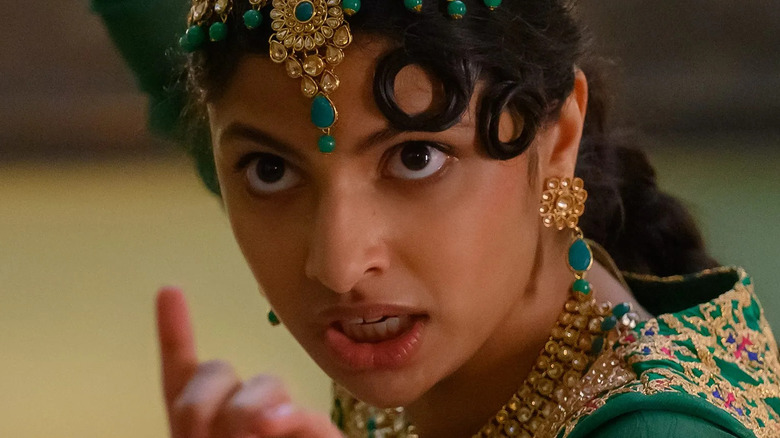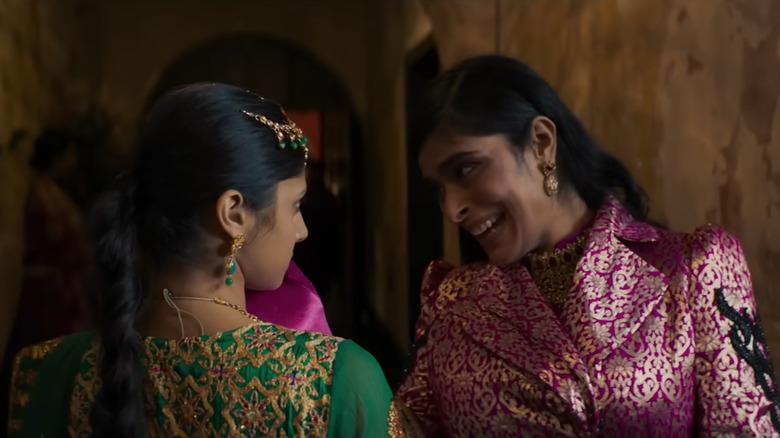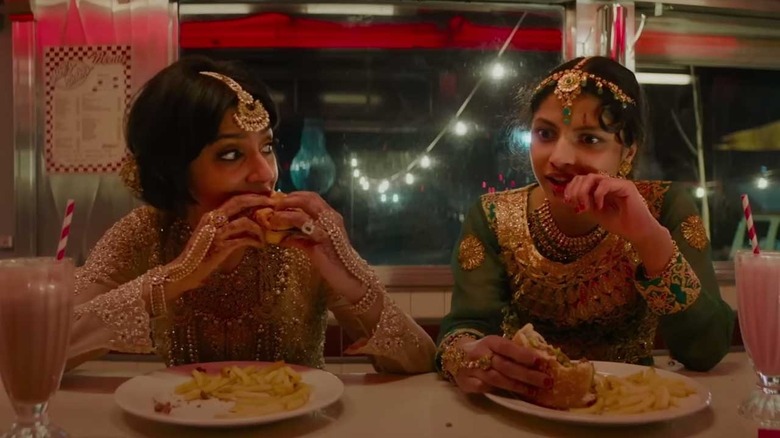Polite Society Review: A High-Flying Kick Of A Comedy
- Very fun and funny
- Great fight scenes
- Creative mix of genres
- Character arcs are lacking
- Somewhat mixed messages
The Sundance Film Festival's midnight programming trends toward horror and otherwise edgier films — making "Polite Society" something of an outlier among the 2023 lineup. While this action-comedy directed by "We Are Lady Parts" creator Nida Manzoor technically fits as a "midnight movie" due to its eccentricity and significant appeal to cult genre movie aficionados, it feels like its destiny is as a gateway into this world for younger audiences. Many teenagers are going to love this movie if they see it, and I seriously hope the team at Focus Features knows how to successfully market to them.
"Polite Society" builds a wacky genre-bending tale around the believable bond between two sisters. High schooler Ria Khan (Priya Kansara) wants nothing more than to be England's greatest stuntwoman, and her art school dropout older sister Lena (Ritu Arya) helps her film videos of attempting — and often failing — various stunts for her "Khan-Fu" YouTube channel. Ria has looked up to Lena as someone who's defied their careerist parents' expectations — so when Lena abandons her artistic pursuits in favor of marrying a wealthy doctor she's just met, Ria becomes determined to use her fighting skills to break up their marriage for good.
This is an instantly involving set-up, and the film delivers in terms of pure entertainment. It has exciting action, clever comedic dialogue, a strong ensemble of actors, and solid production values, all adding up to a very good time at the movies. If only the follow-through on the character arcs and thematic implications was a bit more thoughtful, this could have been a great one.
Scott Pilgrim in a sari
Has Edgar Wright somehow become one of the most influential directors for filmmakers telling South Asian diaspora stories? "Scott Pilgrim vs. The World" was cited as an influence on the visual style of the "Ms. Marvel" Disney+ series. While "Polite Society" doesn't go nearly as over-the-top with animation effects, the way it films and edits its fast-paced comedic fight scenes also feels heavily indebted to Wright's action-comedies (coincidentally, Nimra Buchra plays antagonists in both "Ms. Marvel" and "Polite Society," and seems to be having a lot more fun relishing her role in the latter).
Manzoor's film also shares with "Scott Pilgrim" a distinctly geeky variation of magical realism, wherein the workings of the universe directly reflect the main character's special interests. A martial arts beatdown at school in the first act quickly establishes that "Polite Society" is playing with the heightened action movie sensibility befitting Ria's unusual ambitions. By the time the story swerves into more unexpected genre territory, the audience is already accustomed to rapid shifts in styles and thus is more primed to go along for the ride.
With a story so willing to go as out there as this one does, the action elements end up as much of a "grounding" for the film as the realistic family drama aspects are. The screenplay's wholehearted embrace of genre cliches lends its own form of relatability. There are brief moments of lampshading — one of Ria's friends/partners in crime notes that "tropes are tropes for a reason" when someone questions whether to go through on one particularly familiar scheme — but past a certain point, the film is able to successfully deliver laughs simply by playing such cliches straight without even needing any additional twists or lampshading. With so much creativity on display elsewhere, no one could accuse the use of such cliches as a result of laziness.
A mixed bag as a feminist narrative
There are tons of things to enjoy in "Polite Society" (I haven't even touched upon the gorgeous costumes and groovy musical selections). So why didn't I completely love it despite all these standout elements? Without getting into spoiler specifics, the general issue is that the plot is constructed in a way so that Ria never actually has to grow much as a character. She has moments of compelling struggle, particularly in the middle of the film, but (again, a topic that's hard to discuss without specifics) a lot happens very conveniently to prevent her from ever being too seriously challenged on her perspective in the long run.
Ria frames her anti-marriage stance as a feminist one, a rejection of her culture's patriarchal norms. And in its own satirical metaphorical way, the movie does go on to bring up a lot of serious issues about the ways women are devalued and reduced to biological functions, as well as the ways women can end up reinforcing sexist systems. None of that changes the fact that the plot is primarily driven by Ria trying to actively and at times violently deprive an adult woman of a choice she made — not something that could really be considered "feminist," even if the said choice is objectively bad in the context of the story.
Because Ria is generally right about the things that matter in the plot, the attempts to engage with her deeper flaws end up falling flat. You could argue this is yet another way "Polite Society" can be compared to Wright's "Scott Pilgrim" film, which had little personal growth for its main character compared to the comics it was based on. The difference between the two examples is that Scott is repeatedly shown and said to be a lousy person throughout his film, whereas Ria is someone we're supposed to like — and who we still ultimately end up liking, despite just how frustrating her actions can be and how underdeveloped her arc is. Even with all of its shortcomings in terms of character development, there's still something essentially likable and sweet at the center of this joyous piece of entertainment.
"Polite Society" opens in theaters on April 28.


